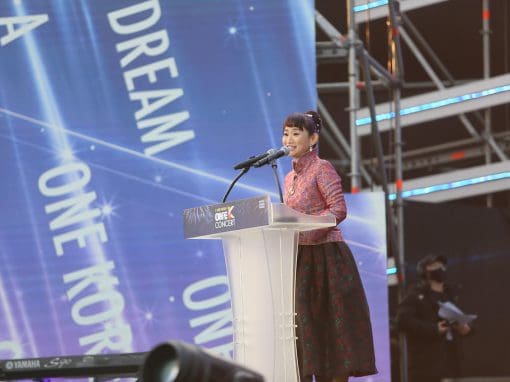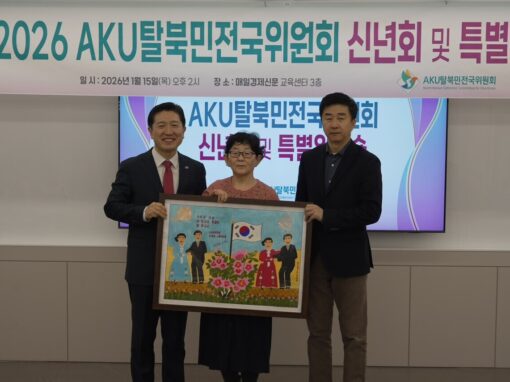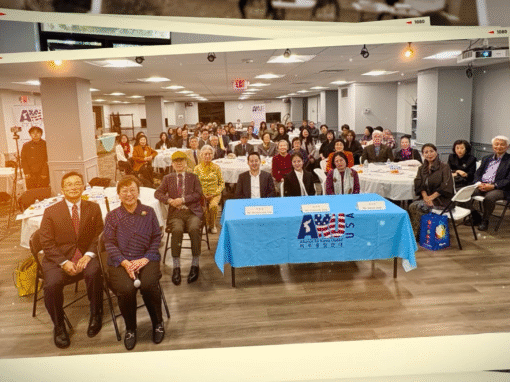On September 6, 2025, Global Peace Foundation (GPF) Japan hosted the third Korean Dream Online Study Session under the theme, “The Changing Situation in Northeast Asia – Is Peaceful Unification of the Korean Peninsula Truly Possible?”
This online session is designed to deepen participants’ understanding of the division of the Korean Peninsula and the future of East Asia, drawing from the ideas presented in the Korean bestseller by Dr. Hyun Jin P. Moon Korean Dream: A Vision for a Unified Korea.
The forum is co-hosted by GPF Japan, which has been engaged in peacebuilding activities in Northeast Asia, and Action for Korea United Japan (AKU Japan), led by Eiko Kawasaki, an organization dedicated to the peaceful unification of the Korean Peninsula.
Once again, Eiko Kawasaki, a North Korean escapee and human rights activist, joined the session to share her reflections and discuss the role of civil society in realizing One Korea.
Read about Eiko’s memorable experiences below:
Eiko Kawasaki — Reflections on Civil Society Initiatives and Her Personal Journey
Eiko Kawasaki is the Representative Director of Action for Korea United Japan (AKU Japan), Chairperson of NGO Modumoija, and Representative of the Shin Botonamu Association. Born in Kyoto as a second-generation Korean resident in Japan, she was sent to North Korea during high school as part of the repatriation program for Koreans in Japan. In North Korea, she lived for 43 years under severe discrimination as a returnee from Japan before escaping the country in 2003. After returning to Japan, she published a book about the fate of returnees and has since been active in legal actions and public advocacy related to North Korea.
The following excerpt is a translation of Eiko Kawasaki’s presentation on the September Korean Dream Study Session seminar.
Campaign for Family Reunions and the Normalization of Correspondence with North Korea
In mid-July, together with Lee Sora, Secretary General of Modumoija, I visited South Korea for one month to carry out an international campaign aimed at confirming the safety of family members in North Korea and restoring regular correspondence with them.
On July 18, we held a meeting at the National Assembly Members’ Hall, attended by representatives from the United Nations Office in Korea, North Korean defectors, and families of victims related to this issue.
To draw attention to the urgency of the situation, we began a one-day fasting relay at Imjingak on July 17, continuing until October 4, the Day of Separated Families. Participants take turns fasting one by one for a total of 80 days. I personally joined the fast on the second day. Through this action, we appealed that the right to confirm the life or death of one’s family and to exchange letters are fundamental human rights.
We are also conducting a signature campaign to deliver petitions to the United Nations and international organizations, calling on the global community to recognize the deep human suffering behind this issue.
Public Outreach in South Korea and Citizens’ Reactions
Next, I would like to share some impressions and positive developments toward realizing One Korea from the AKU events held on August 14 and 15.
During the events, we conducted street outreach activities for the first time in Daegu and Busan. Although our team consisted of only two people, we received warm and encouraging responses from Korean citizens.
One particularly memorable moment occurred while we were holding banners and speaking in front of the Busan City Council early in the morning. Two young police officers approached us, deeply moved by the message on our banner, and kindly offered to buy us breakfast. Their gesture gave me great encouragement and confidence in the growing empathy of the Korean people.
AKU Events and Future Initiatives
The events held on August 14 and 15 were grand and inspiring, both day and night. Through the passionate speeches and performances of Dr. Hyun Jin Preston Moon, I could feel a strong determination toward unification.
At the same time, I believe that beyond impressive presentations, what truly matters are concrete actions that lead to genuine unification. In this respect, AKU Japan has been taking practical steps based on the experiences of North Korean victims, including legal actions and public awareness campaigns. I believe this demonstrates our strong capacity for action.
On October 29, a retrial will take place regarding our ongoing legal case, and I am confident that the outcome will remain in our favor. Such developments, I believe, contribute positively to the overall realization of One Korea.
I also had the opportunity to visit Mr. Inteck Seo, President of AKU Korea, whose activities are extremely dynamic. By strengthening collaboration between AKU Korea and AKU Japan, I am hopeful that our joint efforts will bring even more tangible progress toward achieving One Korea.
The Benefits of a Unified Korea for Japan
If One Korea—a unified Korean Peninsula—becomes a reality, it will bring tremendous benefits not only to Koreans but also to Japan. A unified Korea could engage with Japan as a normal and equal neighbor. Moreover, by utilizing North Korea’s abundant underground resources, South Korea’s economic growth would accelerate significantly. I know this well because I once worked at an institution that studied mineral resources.
Curiously, the 38th parallel seems to extend underground—North Korea possesses nearly every kind of mineral resource except diamonds, while South Korea has very few. Thus, unification would not only achieve ethnic and spiritual integration but also generate enormous material prosperity. This would have positive ripple effects on Japan, the United States, and the global economy. Furthermore, humanitarian issues such as abductions and the separation of families would finally find resolution.
Japan’s Disadvantages from Continued Division
Conversely, if the division of the Korean Peninsula continues, the abduction issue will remain unresolved—Megumi Yokota (a Japanese citizen abducted by North Korea in 1977) will never return home, and I, too, will be unable to reunite with my family.
Economic growth and resource development will also remain limited. North Korea has no intention of resolving the abduction issue unless its regime survival is threatened. As long as the peninsula remains divided, Japan will continue to suffer from these consequences.
Therefore, Japan—not only its government but also its people—must take the realization of One Korea seriously.
Of course, international support is essential. To end the last remaining division on Earth, we need the solidarity of the global community and the awareness of each individual citizen. I firmly believe that achieving One Korea will bring not only regional peace and prosperity but also great benefits to the entire world.
My Personal Aspiration for One Korea
For me, the realization of One Korea—a unified Korean Peninsula—is a matter of life itself. It is deeply personal and urgent.
Since escaping from North Korea in 2003, I have not been able to reunite with my family left behind, and 23 years have now passed. Since the COVID-19 pandemic, the regime has completely sealed its borders, cutting off all means of communication—no letters, no phone calls, no transfer of goods or money. The last time I heard my youngest daughter’s voice was in November 2019, and I have had no contact since.
If only correspondence or the exchange of goods could resume as before—it would mean so much. But now, every path feels closed. At the age of 83, I feel that I am racing against time itself. I cannot die without seeing my family again.
That is why I sincerely hope you can understand how urgent and vital the realization of One Korea is to me.
Learn more about the One Korea Global Campaign



